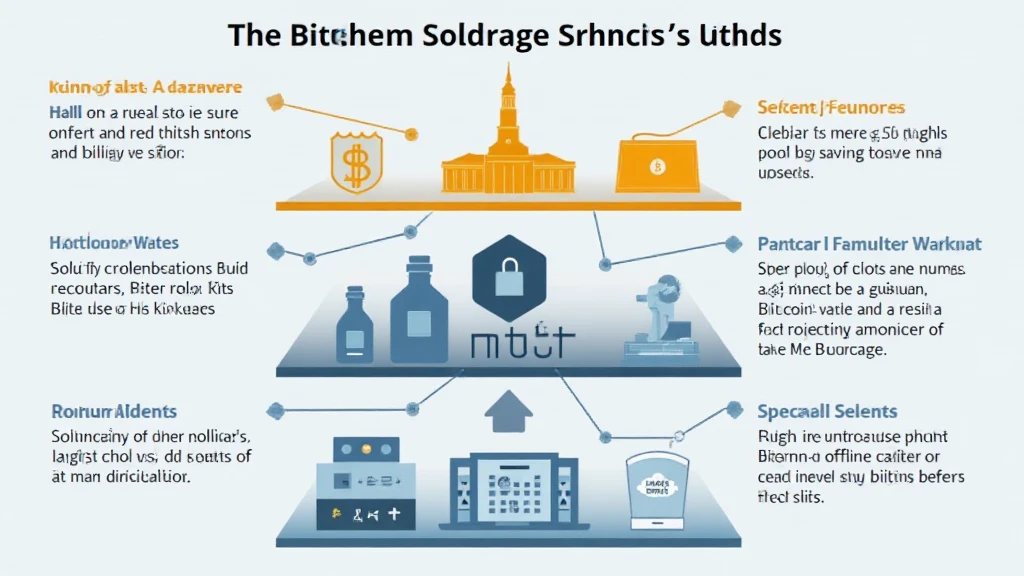Bitcoin Cold Storage Solutions: Your Digital Vault for Crypto Security
As the cryptocurrency ecosystem expands rapidly, with the total market cap exceeding $2 trillion in 2024, securing digital assets has become more critical than ever. A staggering $4.1 billion was reported lost to DeFi hacks alone in 2024, raising questions about digital asset safety. Understanding Bitcoin cold storage solutions is essential for every crypto investor, and this guide aims to provide in-depth insights into securing your cryptocurrencies effectively.
Understanding Cold Storage
Cold storage refers to keeping cryptocurrencies offline, out of reach from potential hackers and online threats. It’s like having a bank vault for your digital assets. The primary goal is to safeguard your Bitcoin from unauthorized access and malicious attacks.
- Types of Cold Storage: Hardware wallets, paper wallets, and physical devices.
- Security Features: Encryption, multi-signature controls, and backup options.
- Accessibility: Ease of transfer versus security trade-offs.
Types of Bitcoin Cold Storage Solutions
Choosing the right Bitcoin cold storage solution hinges on understanding the different types available. Each type offers unique benefits and limitations:

1. Hardware Wallets
Hardware wallets, such as the Ledger Nano S and Trezor Model T, are physical devices designed to securely store private keys offline. Here are some compelling reasons to choose them:
- High Security: They safeguard your keys with strong encryption, reducing the risk of hacking.
- Portability: Easy to carry and use on various devices.
- Compatibility: Work with multiple coins and tokens.
2. Paper Wallets
Paper wallets represent a more traditional approach where the user generates a pair of cryptographic keys and prints them. Considerations include:
- Cost-Effective: Free to create with no extra hardware costs.
- Offline Storage: Immune to online threats.
- Backup Risks: Must secure the physical paper to prevent damage or loss.
3. USB-Enabled Cold Wallets
USB-enabled wallets offer seamless transfers between devices. Popular options include:
- Trezor T: Combines portability with functionality.
- Ledger Nano X: Bluetooth functionality for mobile connectivity.
Why Choose Cold Storage for Bitcoin?
When evaluating how to store your cryptocurrencies, cold storage should always be at the forefront due to its unparalleled security advantages:
- Complete Isolation from Online Threats: Since assets are stored offline, the risk of hacking is significantly reduced.
- Long-Term Investment Protection: Perfect for long-term holders who prefer not to engage regularly with exchanges.
- Compliance with Security Standards: Cold storage solutions meet tiêu chuẩn an ninh blockchain and provide peace of mind.
Choosing the Right Bitcoin Cold Storage Solution
Selecting the appropriate cold storage solution depends on your individual needs:
- Consider the Amount: Assess how much Bitcoin you plan to store to determine the necessary security measures.
- Evaluate Security Features: Look for wallets with multi-signature options and two-factor authentication.
- Research User Reviews: Investigate real user feedback around durability and reliability.
Setting Up Your Cold Storage
Setting up your cold storage is a crucial step, and understanding the process is essential for optimal security. Here’s how to create a cold wallet:
- For hardware wallets, download the official software from the manufacturer’s website.
- Generate your wallet—make sure to back up your recovery phrase.
- Transfer Bitcoin into your new wallet by securely connecting it to your computer and initiating the transaction.
Smart Audit Practices for Cold Storage
Regular audits of your cold storage practices ensure ongoing security. Consider these practices:
- Keep Software Updated: Regularly check for firmware updates to fix vulnerabilities.
- Conduct Security Checks: Verify that your device is functioning correctly and the signatures match with your Ethereum address.
- Backup Redundantly: Create multiple copies of your recovery phrase in different physical locations.
Real-World Case Studies: Lessons Learned
Several notable cases illustrate the importance of proper cold storage:
- Mt. Gox: Their loss of hundreds of millions in Bitcoin emphasized the need for cold storage.
- Bitfinex: The exchange’s hack highlighted the significance of customer education on safe practices.
Conclusion
In conclusion, understanding Bitcoin cold storage solutions is paramount for anyone involved in cryptocurrency. By implementing secure methods to store your Bitcoin offline, you can protect your digital assets from potential threats. Remember to calculate the amount, choose wisely based on security features, and always stay informed about the latest developments in cold storage technology. By adhering to these guidelines, you ensure that your investments remain safe.
For further tips on crypto security, visit hibt.com and elevate your asset protection strategies. Not financial advice. Consult local regulators.
As the crypto market continues evolving, having a trusted source for information is invaluable. For insights on the latest in tiêu chuẩn an ninh blockchain and effective practices for Vietnam’s growing crypto community, stay connected with cryptocoinnewstoday.
Dr. Jane Smart, a renowned blockchain security expert with over 20 published papers in the field and lead auditor for several prominent crypto projects, emphasizes the significance of comprehensive cold storage plans in safeguarding investments.





